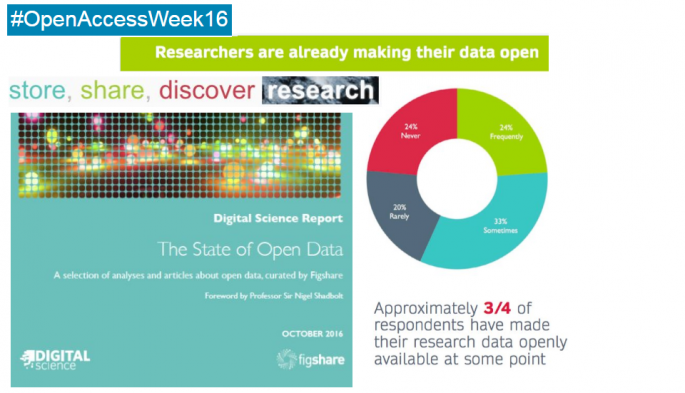‘The State of Open Data’ Figshare’s Report: global trends around Open Data
27/10/2016

.bmp)
To jump on the Open Access week 2016 celebrations, Figshare released (October 25, 2016) a landmark report titled The State of Open Data presenting a selection of analyses and articles about Open Data.
__________________________________________________________________________________________________________
As part of International OA Week Figshare released a report The State of Open Data to assess the global landscape around Open Data (OD) and sharing practices. The report was supported by Digital Science and the survey on awareness and use of OD was conducted in partnership with Springer Nature.
In particular, the Report gathers insights and narratives from leading professionals in the OD space from around the globe and highlights the extent of awareness around OD, the incentives around its use, and perspectives researchers have about making their own research data open.
The key findings of the Report include:
- For the majority of respondents, open data is already a reality:
Approximately three quarters of respondents have made their research data openly available at some point; a similar number are aware of data sets that are open to access, reuse, repurpose and redistribute.
- Researchers place value on the credit they receive for making data open:
Nearly 70% of researchers value a data citation as much as an article citation. A further 10% value a data citation more than an article citation.
- Awareness of OD transcends age and career progression:
Encouragingly, Principal Investigators (PIs) and Professors consistently responded similarly to PhD students and Post-doctoral fellows in their awareness of OD usage.
- Respondents admit to uncertainty and gaps in their knowledge and are hungry for more information, perhaps one set of critical factors that hold back progression in OD sharing:
60% of respondents are unsure about the licensing conditions under which they have already shared their data, and thus the extent to which it can be accessed or reused.
- Researchers are uncertain of how to cite datasets:
Less than half of respondents say they are confident in how to cite a secondary research dataset.
- There are indications that the future will be more open:
Researchers who have never made data openly available are considering doing so – of respondents who have not made any data open to date, 44% will definitely consider doing so in the future, and a further 46% might consider doing so.
Contributed articles include:
1. Open by Default.
2. Why Open Data Now? Big Data, Knowledge Production and the Political Economy of Research.
3. Open Season for Open Data: A Survey of Researchers.
4. Open Data Will Save Lives – Notes from the AllTrials Campaign for Clinical Trials Transparency.
5. Practical Steps for Increasing the Openness and Reproducibility of Research Data.
6. Emerging Policies for Open Research Data in the United States.
7. Building Trust – The State of Open Data in Burkina Faso.
8. The State of Australian Research Data – Systems are Ready but Where are the Incentives?
9. Can Japan Catch Up? Fostering Culture, People, and Community for Research Data.
10. The Bird in Hand: Humanities Research in the Age of Open Data.
Download “The State of Open Data Report”
The raw data behind the survey
__________________________________________________________________________________________________________
Other contents related to Open Access Week 2016 : 'Open in Action!'
European open access strategies
Open Access eBooks on JSTOR [Open Access monographs are now available on the JSTOR platform]
Open-Access Monograph Publishing
Hybrid open access - an analysis
Webcast: The state of Open Access (Peter Suber)
Established by SPARC and partners in the student community in 2008, International OA Week is an opportunity to take action in making openness the default for research - to raise the visibility of scholarship, accelerate research, and turn breakthroughs into better lives.
